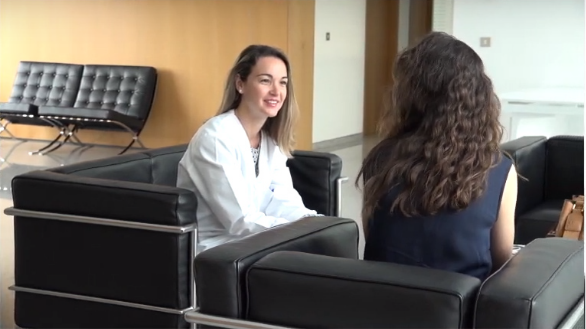
Mumps and male infertility
Índice
Mumps, what is it?
Parotitis, more commonly known as “mumps”, is a contagious viral disease that affects one or both parotid glands (major salivary glands) situated behind the ascending rami of the mandible. It is caused by the mumps virus and typically affects children and teenagers, although it may also cause infections in sensitive adults. In general, the disease produces lifetime immunity, and it may be prevented by the administration of the combined MMR vaccine. Mumps may affect other glands in the body, the central nervous system and the testicles.
Which are the most frequent complications with mumps? Can mumps cause male infertility?
The most frequent complications are meningitis and testicular inflammation which may lead to infertility. This inflammation of the testicle is also known as mumps orchitis. It is not very frequent, affecting 1 per million inhabitants per year among the general population.
What are the mumps symptoms?
20% to 30% of cases are asymptomatic and the infection can only be detected by the presence of antibodies in the blood. The initial symptoms of mumps are:
- headache,
- feeling generally unwell,
- occasional fever of no more than 38 °C and
- jaw pain, especially when touched.
- These symptoms appear slightly before the onset of inflammation and facial swelling, caused by the enlargement of the glands.
The process generally begins in the parotids, which do not usually both increase in size at the same time. The sublingual and submandibular salivary glands may subsequently be affected, with an increase in pain and oedema. This disease not only affects the salivary glands: it may also affect the pancreas, the testicles (orchitis affects 25-40 per cent of men who have completed puberty) and the ovaries.
The incubation period lasts between 18 and 21 days. Symptoms include general malaise with an unpleasant sensation in the throat, caused by the enlargement of the parotids and a dry mouth, since the secretion of saliva is reduced. In teenagers, it may become more complicated when the testicles are affected. Full recovery is the norm, but in some cases it may lead to atrophy of the testicle, with subsequent sterility
Mumps orchitis, anti-sperm antibodies and infertility

Orchitis secondary to mumps is considered the most obvious complication of mumps and it is a frequent cause of infertility. Pathological examinations based on testicular biopsies of patients with orchitis due to epidemic mumps have revealed variable degrees of permanent damage to the seminiferous tubules, with oedema, perivascular lymphocytic infiltration and diffuse infiltration of interstitial tissue with focal haemorrhage especially in acute cases. A rapid recruitment of leucocytes takes place in the testes and the mechanisms of infertility have not been fully understood, especially the participation of anti-sperm antibodies.
Antisperm antibodiesas mumps consequence
It is generally accepted that anti-sperm antibodies may be a factor that negatively affects fertility after orchitis owing to a complication of this virus and there are various hypotheses regarding the mechanisms responsible for this condition:
- rupture of the blood-testis barrier followed by sperm filtration and immunological sensitization to sperm antigens,
- behaviour of the virus as an immunogen, which induces the production of anti-sperm antibodies;
- immunological similarity between the virus and the spermatozoa.
Impact approaches
The association between anti-sperm antibodies and inflammation of the testicles caused by the mumps virus poses two main questions:
- Does mumps orchitis cause the development of anti-sperm antibodies, which may affect fertility in men?
- Does orchitis secondary to viral mumps contribute antibodies to the overall group of “natural” anti-sperm antibodies?
Only two retrospective studies analyse the possible link between the production of anti-sperm antibodies and mumps orchitis and moreover they do not manage to contribute convincing elements regarding whether mumps orchitis may induce the production of systemic anti-sperm antibodies. Neither of them is able to show any reference to the activity of the anti-sperm antibodies at the start of the illness, since anti-sperm antibodies are sometimes detected in fertile individuals although they have a low incidence and serum levels of little significance.
The presence of natural anti-sperm antibodies in fertile human beings and even in virgin girls and prepubescent boys has led to increased interest regarding their origin. The differences according to age in patients with natural antibodies against autoantigens and antibodies against exogenous antigens have been well established: whilst the frequency of antibodies against autoantigens increases gradually in individuals of middle-age and above, antibodies against exogenous antigens appear early, reach a maximum before puberty and then decrease slowly. In conclusion, both the incidence and the median levels of serum anti-sperm antibodies among patients with orchitis secondary to viral mumps were low and they did not increase significantly after the disease. These findings do not strengthen the hypothesis of an increased humoral immunity against spermatozoa after mumps orchitis and they do not show a clear role of this entity in the formation of natural anti-sperm antibodies.
Treatment and prevention
From the point of view of urological complications, treatment is symptomatic and a good differential diagnosis should be performed. The scrotum should be supported using a jockstrap so that the testicles do not hang. The use of analgesics is recommended, as is rest. In the event of intense pain, codeine or meperidine may be taken, or a local anaesthetic with procaine may be injected in the spermatic cord.
The combined MMR vaccine protects against measles, mumps and rubella, and a single dose of the vaccine should be given to children between 12 and 15 months of age, as a means of prevention, which provides active immunity. The vaccination is repeated according to the applicable vaccine schedule.
Dr Luís Prieto, director of urology at the Instituto Bernabeu
THE FOLLOWING MAY ALSO BE OF INTEREST TO YOU
- In Vitro Fertilization (IVF)
- Sperm retrieval techniques
- MACS and other sperm selection techniques
- Sperm meiosis study
- Semen quality parameters according to the World Health Organisation (WHO)
- New diagnosis technique for male sterility and missing genetic material (Y chromosome microdeletions).
